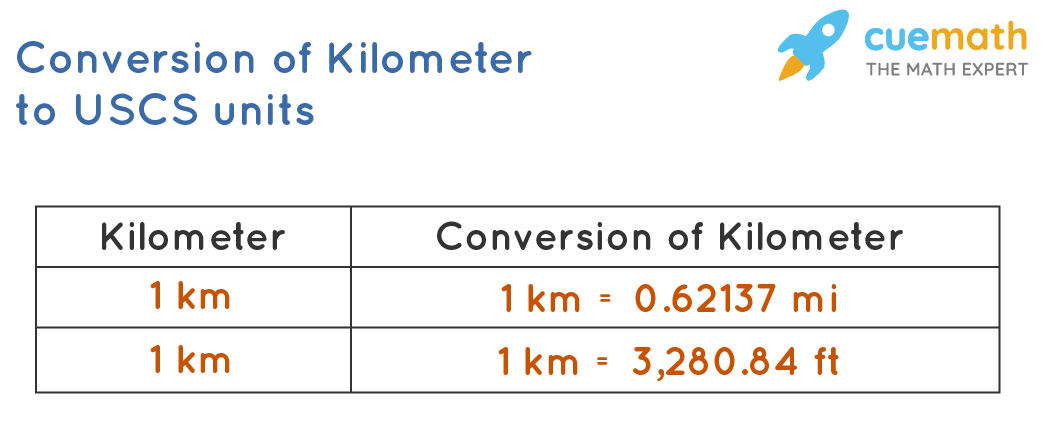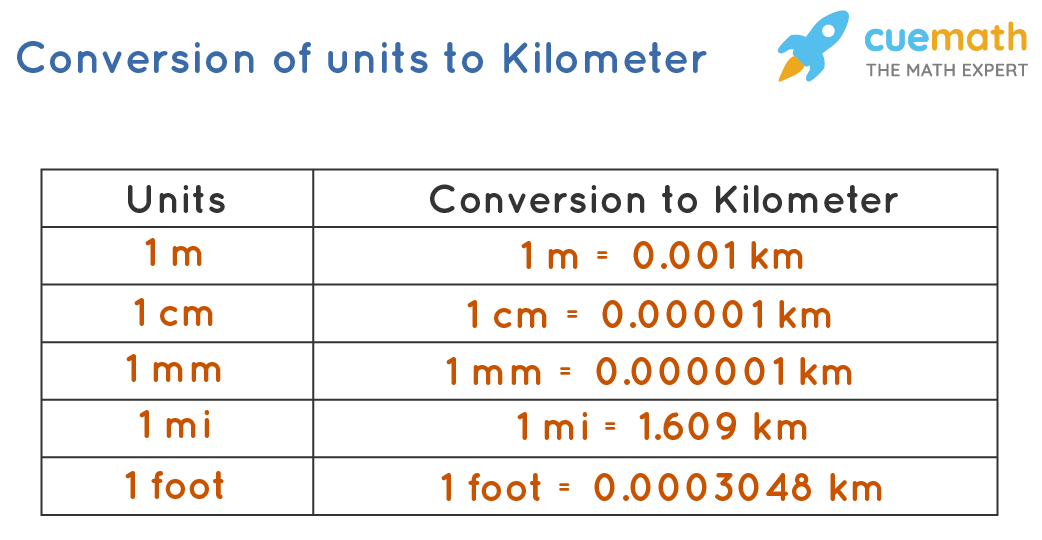Kilometer
Kilometer is a unit used to measure length or distance. It is a unit used in metric system. The distance can also be measured in miles, which can be expressed in terms of kilometer. Though miles and kilometers represent the same quantity, their value differs. In this chapter we will also find the relation between kilometer and many units like, miles, meters, centimeters, feet, milimeters. Stay tuned to learn more about kilometers!
| 1. | Definition of Kilometer |
| 2. | Kilometers and Miles |
| 3. | Distance Conversions |
| 4. | Solved Examples on Kilometer |
| 5. | Practice Questions on Kilometer |
| 6. | FAQs on Kilometer |
Definition of Kilometer
Kilometer is a unit of the metric system mainly used to express a distance. The abbreviation of kilometer is km. It is a unit of the International System of Units (SI units). Examples: Some examples of distances in kilometers are, the distance from one city to another city, the distance of a runway, the distance you would cover while taking a walk can also be measured using km.
Kilometers and Miles
As per the kilometer definition, km is used to express the distance as an SI unit. A mile is a unit followed in the United States for measuring distance. The metric unit followed in the United States is called the "United States Customary Units (USCS)". Even though kilometers and miles are used for measuring the same unit (distance), the value differs. Although kilometer is not a unit of the American metric system (USCS), it is frequently used in the field of science, medicine, and military forces.
Distance Conversions
Conversion is needed wherever long distances are measured. In this section, we will learn the relation between kilometers and other units of distance like, meters, centimeters, millimeters, miles and feet. We will also learn how to convert other units to kilometers too.
Kilometer to Meters
Meter is a SI unit of distance. It is abbreviated as m. The relation between kilometer and meters is given as, 1 kilometer (km) = 1,000 meters (m).
Kilometer to Centimeters
As meter can be expressed in centimeters as, 1 meter (m) = 100 centimeters(cm). Thus, the relation between kilometer and centimeters is given as, 1 kilometer (km) = 1000 × 100 = 1,00,000 centimeters (cm).
Kilometer to Millimeters
As centimeters can be expressed in millimeters as, 1 centimeter (m) = 10 millimeters(mm). Thus, the relation between kilometer and millimeters is given as, 1 kilometer (km) = 1,00,000 × 10 = 1,000,000 millimeters (mm).
Similarly, it is possible to convert kilometer to USCS units, miles and feet.
Kilometer to Miles
Miles is the USCS unit mainly used to indicate distance. It is abbreviated as "mi". The relation between kilometer and miles is given as, 1 km = 0.62137 mi.
Kilometer to Feet
Feet is also the USCS mainly unit to indicate length. The singular unit for feet is given as foot. It is abbreviated as "ft". The relation between kilometer and feet is, 1 km = 3,280.84 ft.

Now, that we have learned to convert kilometers to the units like meters, centimeters, millimeters, miles, and feet. Let us try converting these to kilometers.

Topics Related to Kilometer
- Metric System
- Metric Conversion Chart
- Convert km/h to m/s
- Accurate vs Precise
- Length Conversion
- Miles to KM formula
- Measurement
- How Many Centimeters Make a Kilometer?
- System of Measurement
- Unit Conversion Formula
- How Long is a Meter
- Kilometer to Mile Calculator
- 5th Grade Metric Conversion Worksheets
Solved Examples on Kilometer
-
Example 1: Mia wants to measure the distance between her school and her home. Help Mia choose the right type of measurement.
a. Kilometer b. Gallons c. Pounds
Solution: a. Kilometer is the right choice.
As Kilometer is a unit of distance while Gallons and Pounds are units of measurement of volume and mass respectively, the option (a) is the right choice. -
Example 2: Anna ran the same distance every day for 5 days. She covered 5 km in 5 days. How many meters did Anna run per day?
Solution: As we know, 1 km = 1000 m.
Hence, 5 km = 5000 m
To find the meters she ran per day, we have to divide 5000 m by 5, \(\dfrac{5000}{5}\) m = 1000 m
Therefore, Anna ran 1000 m per day. -
Example 3: A blackboard in a classroom is about half a kilometer long. What is the length of the blackboard in cm?
Solution: As we know, 1 km = 1,00,000 cm.
Hence, length of half a kilometer long blackboard is \(\dfrac{1}{2}\) km = \(\dfrac{100000}{2}\)cm
Therefore, the blackboard is 50,000 cm long. -
Example 4: Ruth plans to visit a nearby hospital for her annual medical examination. She finds a hospital 6 km away from her house. How many miles does Ruth have to travel to reach her destination?
Solution: We know that, 1 km = 0.62137 mi.
Ruth must travel 6 km to reach the hospital.
6 km = 6 × 0.62137 = 3.728 miles
Therefore, Ruth has to travel 3.728 miles to reach the hospital.

Practice Questions on Kilometer
go to slidego to slidego to slidego to slidego to slide
FAQs on Kilometer
What is the Kilometer to Miles table?
We know that 1 kilometer (km) equals to 0.62137 miles.
- 1 km = 0.62 mi
- 2 km = 1.24 mi
- 3 km = 1.86 mi
- 4 km = 2.48 mi
- 5 km = 3.1 mi
- 6 km = 3.72 mi
- 7 km = 4.34 mi
- 8 km = 4.96 mi
- 9 km = 5.58 mi
- 10 km = 6.2 mi and so on.
Is Kilometer Larger Than a Mile?
1 mile equals to 1.609 km, which signifies that a mile is larger than a kilometer.
What is 1 KM Equal to in Meters?
1 kilometer is equal to 1000 meters.
What is 3 Kilometers in Miles?
3 kilometer is 1.864 miles.
How Many Kilometers Makes 1 Mile?
There are 1.609 kilometers in a mile.
How Long is a Kilometer in a Feet?
There are 3,280.84 ft in a kilometer.
Is 2 KM Longer Than a Mile?
Yes, 2 km is longer than a mile as 1 mile is 1.609 km.
visual curriculum
